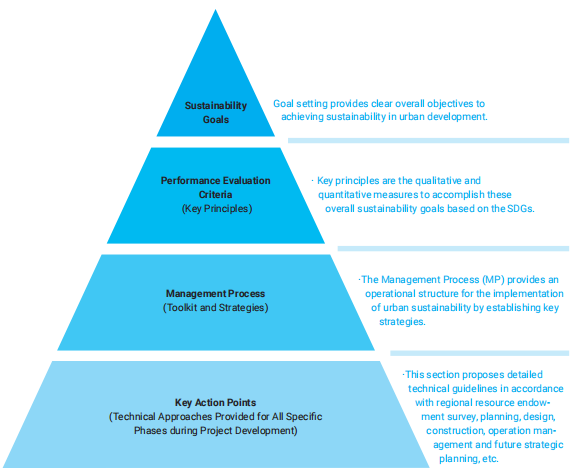Evaluation Criteria, Management Process and Key Action Points
Background
In September 2015, the 2030 Agenda for Sustainable Development was unanimously adopted by the 193 member states of the United Nations, providing guidance for the development of global countries in the coming 15 years. “Sustainable Cities and Communities” is listed as SDG11: make cities inclusive, safe, resilient and sustainable, among the 17 goals of the 2030 Agenda.
However, the 2030 Agenda does not provide managers, developers and operators of local cities and communities with specific measures and methods to achieve this sustainable development model. At the same time, the rapid urbanization in developing countries and emerging economies has also given birth to the construction of a large number of “new urban areas” and “new communities”. As most of those cities and communities lack adequate understanding of the 2030 Agenda and SDGs, a set of standards and implementation guidelines for operation and reference is urgently needed.
Accordingly, the UN Environment officially launched the Sustainable Urban Development and Livable Garden Community Programme(SUC Programme) and the preparation of the “Guidelines for Sustainable Cities and Communities – Evaluation Criteria, Management Process, Key Action Points”(SUC Guidelines) in 2015, aiming to provide guidance for developing countries in implementing SDG11 and developing sustainable cities and communities that meet the highest international standards. SUC Programme is first piloted in China with UN-Habitat, the United Nations Office for Sustainable Development(UNOSD) and the International Energy Agency(IEA) subsequently joining in the cooperation.
The partners of SUC Programme includes Environmental Development Centre of Ministry of Environmental Protection, All-China Environment Federation, China Center for International Economic Exchanges of NDRC, China Real Estate Chamber of Commerce, Sustainable Development Center of China Academy of Social Sciences, China Academy of Building Research and Tongji University. As the co-preparation and implementation agency of SUC Guidelines, SUC Programme Management Center(SUC PMC) provides fund and organizes Chinese experts for the compilation of the Guidelines.
The“Guidelines for Sustainable Cities and Communities – Evaluation Criteria, Management Process, Key Action Points”was officially released globally in Cairo on 15 December 2018 as a UN publication(Job No: DTI/2207/PA) after four years of preparation. It has been promoted and implemented worldwide since 2019.
From 2017 to 2018, General Secretary Xi Jinping urged to jointly implement the“Belt and Road Initiative and the 2030 Agenda”and to accelerate the realization of the 2030 Agenda on many important occasions.
As the first international standards on sustainable cities and communities developed by the United Nations since the implementation of 2030 Agenda, SUC Guidelines provides international guidance for the high quality development of Chinese cities and communities, new urbanization and ecological civilization as well as the implementation of 2030 Agenda.
About SUC Guidelines
This Guidelines will be mainly applied to developing countries. In its early phase, the aim is to support the promotion and implementation of sustainable development of cities and communities in China.
-----Introduction of UNEP SUC Guidelines
The“Guidelines for Sustainable Cities and Communities – Evaluation Criteria, Management Process, Key Action Points”(SUC Guidelines) is the first set of international standards for sustainable cities and communities developed by the UN system since the release of 2030 Agenda for Sustainable Development. Started in January 2015, the preparation of SUC Guidelines was led by the UN Environment and participated by the UN-Habitat, UNOSD and other agencies. It was released globally at the first International Conference on Sustainable Development in Cairo on 15 December 2018 as a UN official publication.
In line with SDG11 and based on the UNEP Global Initiative for Resource Efficient Cities(GIREC) and Sustainable Buildings and Climate Initiative(SBCI), SUC Guidelines fully draws on the ISO37120/37101, the UN-Habitat City Prosperity Index, Green Building Evaluation Standard,National Garden City Standards and international best practices, providing clear development goals, key performance indicators, specific implementation measures and international evaluation standards for the sustainable development of cities and communities in China and other developing countries. The Guidelines is applicable to the sustainable construction and evaluation of cities and communities globally. In its early phase, the aim is to provide guidance for the sustainable development of cities and communities in developing countries. It is first applied in China.
Experts from MOHURD, Ministry of Environmental Protection, NDRC, Standardization Administration, CAS, China Academy of Building Research, Tongji University, Zhejiang University and City University of Hong Kong had joined in the preparation of the Guidelines since 2015.

Evaluation Criteria
The first part of the SUC guidelines identified and described the key sustainability goals and evaluation criteria that drive sustainable development and delivers Key Principles for Sustainable Cities and Sustainable Communities based on a thorough review of Chinese and global best-practice sustainable development.
Sustainable Development Goals for Cities
1. Safe and Affordable Cities
2. Transportation and Accessibility
3. Cultural and Natural Heritage
4. Land Use Efficiency
5. City Disaster Resilience
6. Healthy Environment
7. Safe and Sustainable Green Open Spaces
8. Resource Efficiency
City Management and Policy
Sustainable Development Goals for Communities
1. Sustainable Buildings
2. Inclusive Community Facilities and Service
3. Liveable Community Landscapes
4. Economic Productivity
5. Safety
6. Proud and Educated Community
7. Community Management
The SUC Management Process (SUC MP) provided an operational structure for the implementation of urban sustainability by establishing key strategies. The five key strategies include:
The SUC Key Action Points (SUC KAPs) provided concise technical objectives in order to achieve the identified Sustainable Cities and Sustainable Communities goals, addressing each key process in the urban development life-cycle, including: Resource Endowment Survey (Project Areas), Planning and Design, Product and Materials Selection, Building and Construction, Operation and Management and Future Strategic Planning, as well as key performance assessment tools.